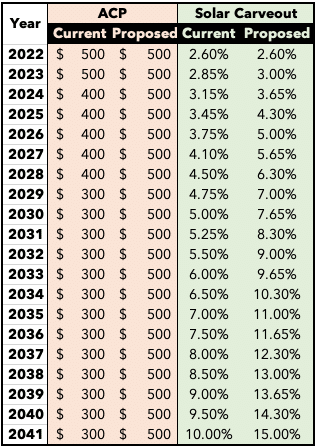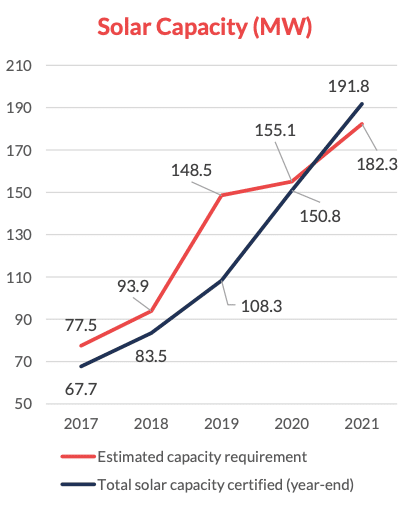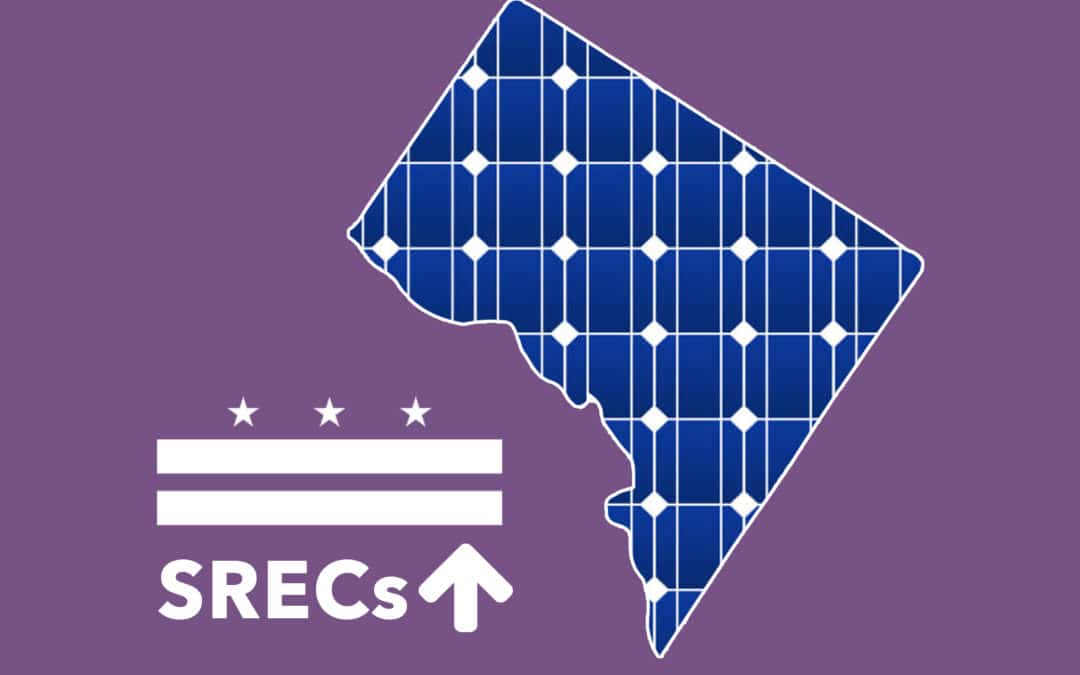On the local level, the Building Energy Performance Standards CREF Amendment Act of 2022 and the Local Solar Expansion Amendment Act of 2022, if passed in the current form, could lead to push up values of SRECs (Solar Renewable Energy Credits) for the next few decades.
The DC Local Solar Expansion Act of 2022’s Impact on Solar
Those familiar with the local DC solar market know that it is driven by Solar Renewable Energy Credits (SRECs). These are production based incentives that provide ongoing revenue for solar system owners, and DC literally has the most valuable credits in the world.
The price of SRECs is determined like any other commodity: supply and demand. Supply is determined by the amount of solar installed within DC Pepcoland. Demand for these credits is largely determined by two main factors. The first is the Alternative Compliance Payment (ACP). If an electricity supplier fails to meet DC’s RPS requirements, it must pay a penalty called an Alternative Compliance Payment (ACP). However, as an alternative, electric suppliers can buy SRECs, instead of paying ACPs, which always fall below the value of the ACP for that given year. The maximum values of SRECs can never exceed the value of the ACP for that year.
In 2022 the ACP is currently valued at $500 per MWh (1,000 kilowatt-hours). This will decline to $400 in 2024 and $300 in 2029. The DC Local Solar Expansion Act holds the ACP at $500 indefinitely, which will result in higher SRECs, generating a windfall for new and existing PV system owners through 2041.

Finally, this Act is also proposing an increase to the DC Solar Carve-Out, from 10% to 15% by 2041. The Solar Carve-Out is a goal for the percentage of all electricity consumed in DC Pepcoland should come from local solar PV which gradually increases over time. For 2022, the goal is 2.6% and we appear to have already hit this goal, which explains the recent downturn in DC SREC prices. Whenever the total supply of solar generators comes close to or exceeds the DC Solar Carve-Out milestone for that year, prices drop as supply outstrips demand. Increasing the total goal by a factor of 50% will ensure long term price stability and create a windfall profit for both new and existing solar PV system owners.

Caption: The red line reflects the current solar carveout, while the black line represents the total amount of installed solar in DC Pepco. Source: DC Public Service Commission
DC’s Building Energy Performance Standards CREF Amendment Act of 2022
DC Council is also considering passing Bill 24-938, Building Energy Performance Standards CREF Amendment Act. While narrower in focus, this amendment could be a lifesaver for buildings that are subject to BEPS (Building Energy Performance Standards) and especially for condos, co-ops, and apartment buildings.
Firstly, “CREF” stands for a “Community Renewable Energy Facility,” more commonly referred to as, “a Community Solar System”. This type of system is ideal for a building with a large roof but small common area meter usage, such as a multifamily building that is individually metered. Currently, buildings get little to no credit for a CREF system from a BEPS perspective as the clean energy can be subscribed to offsite consumers. This amendment, if passed, will change current law to allow property owners with CREF systems to count their clean energy production to the same amount that traditional solar arrays connected to existing Pepco meters will (Net Energy Metered or “NEM” systems).
Click here to read more about the difference between NEM and CREF systems.
How You Can Help Pass These Bills!
Honeydew Energy Advisors will be testifying in support of both of these solar friendly bills. Please consider offering your support in written statements or live at the hearing on October 3rd, which will be live streamed at https://dccouncil.us/.
If you’d like to help support the local solar industry and solar system owners in the District, you can sign up by contacting Councilmember Mary Cheh.
Even if the local bills don’t pass or are watered down, the new federal legislation will make investing in solar energy systems even more lucrative and we are very proud of the District of Columbia for being a leader in the global climate struggle.

